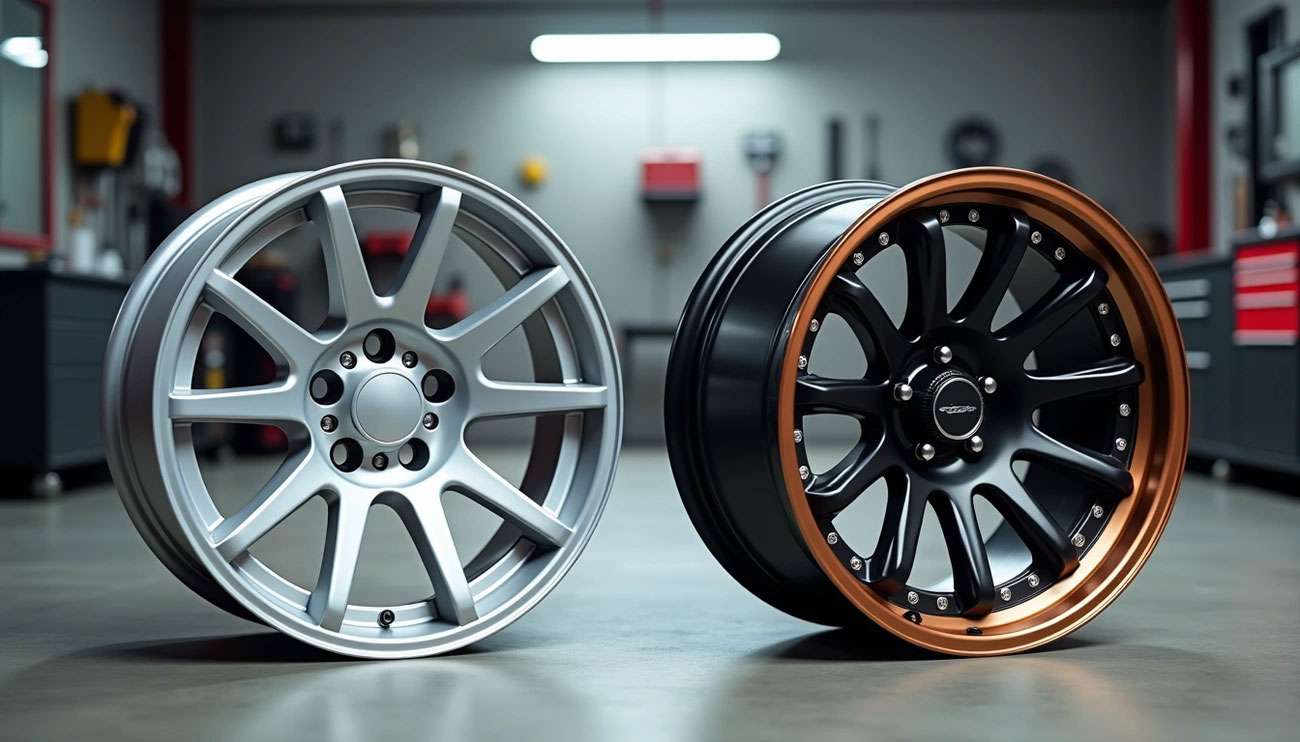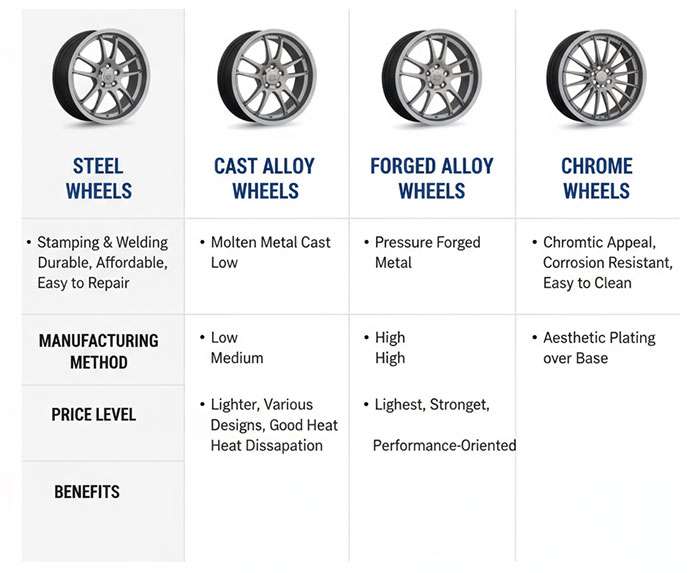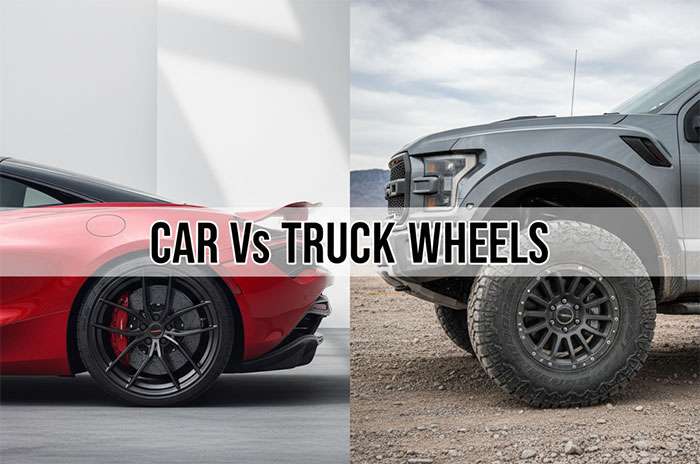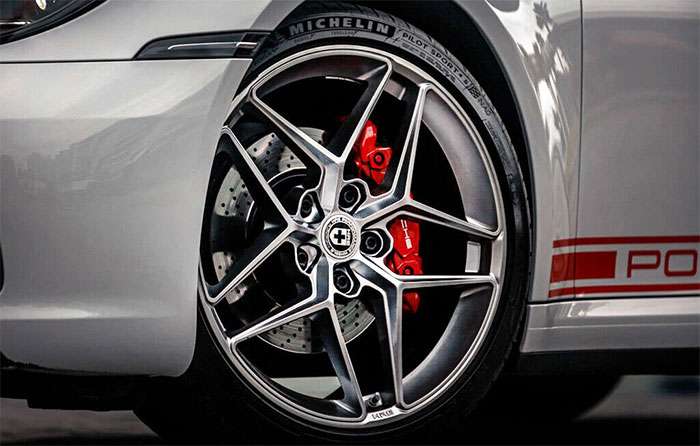
When it comes to OEM vs aftermarket wheels, the selection difference is absolutely staggering. A single search for replacement wheels on a 2022 Ford Bronco Wildtrak reveals over 250 different choices from 16 wheel brands. OEM wheels offer identical, manufacturer-approved options for your specific vehicle. Aftermarket wheels open up an entire universe of customization possibilities.
Original equipment wheels meet basic manufacturer standards for your vehicle model. Aftermarket wheels deliver a significant advantage in performance, style, and overall value. The price range tells the story perfectly - Vision Offroad's 375 in gloss black starts at $887 for a complete set, while Fuel's D696 Covert with matte black and bronze finish runs around $1,672.
The performance benefits pack a real punch. Lighter wheels reduce your vehicle's suspension workload, delivering sharper cornering and more responsive handling. Here's a perfect example: stock wheels on a 10th generation Civic SI weighed about 28 pounds each, while aftermarket options like Enkei wheels weighed just 20.5 pounds. That 7.5-pound difference creates a noticeable improvement you'll feel every time you drive.
We believe understanding the real differences between OEM and aftermarket wheels is essential before making this important investment. Our guide breaks down everything about performance, style options, and long-term value to help you make the right choice for your specific needs and budget.

The distinction between OEM vs aftermarket wheels goes far beyond simple terminology. These terms reflect fundamental differences in design philosophy, manufacturing processes, and quality control standards that directly impact your vehicle's performance.
Original equipment wheels (OEM) come standard on vehicles directly from the factory. These wheels are designed specifically for your vehicle's make, model, and year. OEM wheels are manufactured under strict specifications from the car manufacturer, typically using one of two materials: steel for base models and trucks, or aluminum alloy for higher trim levels.
Most OEM wheels use low-pressure casting - a process where molten aluminum gets pumped into a wheel mold. This manufacturing method represents the most common process approved for aluminum wheels sold to the OEM market. High-performance vehicles sometimes employ flow forming, which enhances structural rigidity while reducing weight compared to standard cast wheels.
Aftermarket wheels are manufactured by third-party companies rather than vehicle manufacturers. These wheels are sometimes called "replica wheels" when they attempt to match OEM styles. Aftermarket wheel brands range from budget manufacturers with minimal quality control to premium companies producing high-performance options.
Construction methods vary significantly across the aftermarket spectrum. Basic gravity casting represents the lowest cost option, while rotary forging and premium forged wheels made by compressing solid aluminum under extreme pressure offer superior performance. Premium aftermarket wheels sometimes use multi-piece construction with two or three components assembled together, offering greater design flexibility.
Quality control standards create the most significant distinction between these categories. OEM wheels must follow strict procedures to maintain quality and integrity, including x-ray inspections and pressurized immersion tests. Aftermarket wheels vary drastically in quality - some undergo rigorous testing while others have minimal quality control.
Design intent differs markedly between the two categories. OEM wheels prioritize reliability and balanced performance for typical driving conditions. Aftermarket wheels often target specific needs - lighter weight for performance, unique designs for style, or specialized construction for extreme conditions.
Manufacturing techniques create the fundamental difference between these wheel types. Most OEM wheels use casting processes that require additional material to compensate for potential porosity, resulting in heavier wheels. Premium aftermarket options deliver significant weight reductions:
Flow-formed (rotary-forged) wheels: 15-25% lighter than cast alternatives
Fully forged aftermarket wheels: 25-30% lighter than comparable cast wheels
Real-world examples show this difference clearly. Standard cast OEM wheels on a typical passenger vehicle weigh 28 pounds each, while premium flow-formed aftermarket alternatives weigh only 18 pounds.
Wheel weight falls into a critical category called "unsprung mass" - components not supported by your suspension. Reducing unsprung weight creates dramatic improvements:
Every 10% reduction in unsprung mass contributes approximately 6% reduction in sprung mass acceleration
Larger, heavier wheels increased 0-60 mph times from 7.6 seconds (15-inch wheels) to 7.9 seconds (19-inch wheels) during controlled testing
Rotational mass requires about three times more energy to accelerate than static weight
Weight location matters tremendously. Mass at the rim creates more rotational inertia than equivalent weight near the hub - similar to an ice skater spinning with arms extended versus arms pulled in.
Quality varies across both categories when it comes to durability. OEM wheels undergo rigorous testing protocols:
Fatigue testing (radial and cornering)
Impact testing (13-degree side impact)
Hydrostatic burst testing
Strain analysis
Premium aftermarket wheels often exceed OEM standards for specific conditions. The key difference lies in failure mode - cast wheels (whether OEM or aftermarket) tend to crack catastrophically under extreme stress, while properly forged wheels typically bend without breaking.

Aftermarket wheels deliver dramatic advantages in personalization that OEM options simply cannot match. The customization possibilities are where aftermarket wheels truly shine, offering vehicle owners the chance to create a truly unique look.
OEM wheels come with limited styles and colors, designed to appeal to the broadest range of customers. This one-size-fits-most approach severely restricts your options. Aftermarket wheels provide virtually endless customization possibilities. The selection ranges from sleek, minimalist designs to bold, aggressive styles that completely transform your vehicle's appearance. Many car enthusiasts choose aftermarket options precisely because they view their vehicles as extensions of personal identity.
Aftermarket wheel finishes far exceed what manufacturers offer:
Chrome-plated finish: Delivers the brightest, most mirror-like reflective appearance
Powder-coated finish: Provides superior durability against rust, heat, chips and scratches
Polished aluminum: Creates a smooth, metallic sheen without the mirror-like reflection of chrome
Additional options: Matte, gloss, satin, and custom paint colors to match your vehicle
Aftermarket options enable fitment configurations impossible with OEM wheels. Staggered setups feature wider wheels at the rear, creating a muscular, planted appearance. You can also customize offset (the distance between the mounting surface and centerline) for a more aggressive stance or to accommodate wider tires.
Find your next set of aftermarket rims at Performance Plus Tire where our custom wheel experts can help you navigate these options to perfectly match your vehicle's aesthetic goals and performance needs.

Image Source: eBay
Making the right financial choice between OEM vs aftermarket wheels means looking beyond that initial sticker price. We need to examine what delivers real value over time.
The pricing gap between original equipment wheels and aftermarket options tells an interesting story. OEM wheels typically command premium prices because of their direct manufacturer connection. Aftermarket wheels offer incredible pricing flexibility—from budget options under $100 per wheel to premium forged wheels over $1,000 each.
Here's what we see most often: mid-tier aftermarket wheels hit the sweet spot for performance enthusiasts. They deliver better performance than OEM without destroying your budget. Your specific budget will determine which direction makes the most sense.
OEM wheels usually maintain stronger value retention when selling to mainstream buyers who want original configurations. High-quality aftermarket wheels can actually attract enthusiast buyers willing to pay extra for these upgrades.
Brand reputation makes all the difference. Well-maintained wheels from respected manufacturers like American Racing or Fuel can increase your vehicle's overall value in the right market. The condition of your wheels plays a huge role in this equation.
OEM wheels typically include coverage under your vehicle's factory warranty. Aftermarket options vary dramatically—some offer limited 1-year warranties while premium manufacturers provide lifetime structural guarantees.
Insurance companies handle aftermarket modifications differently. Standard policies usually cover OEM replacements automatically. Aftermarket wheels might require additional documentation or small premium adjustments. We recommend checking with your insurance provider before making the switch.
Our wheels come with comprehensive warranty coverage to protect your investment and give you confidence in your purchase.
When comparing OEM vs aftermarket wheels, the differences become crystal clear when you examine the key characteristics side by side. Our comparison table breaks down exactly what you're getting with each option:
| Characteristic | OEM Wheels | Aftermarket Wheels |
|---|---|---|
| Manufacturing Process | Low-pressure casting (most common) | Various methods: gravity casting, rotary forging, premium forging |
| Material Options | Steel (base models), aluminum alloy (higher trims) | Multiple materials and construction types, including multi-piece designs |
| Weight (Example) | ~28 pounds | 18-20.5 pounds (premium options) |
| Quality Control | Strict manufacturer standards, x-ray inspections, pressurized immersion tests | Varies by manufacturer (from minimal to rigorous testing) |
| Design Philosophy | Balanced performance for typical driving conditions | Targeted specific needs (performance, esthetics, extreme conditions) |
| Style Options | Limited styles and colors | Extensive variety of designs, finishes, and customization options |
| Finish Options | Standard manufacturer finishes | Chrome-plated, powder-coated, polished aluminum, matte, gloss, satin, custom colors |
| Warranty Coverage | Covered under vehicle's factory warranty | Varies from 1-year limited to lifetime structural guarantees |
| Price Range | Premium pricing due to manufacturer connection | Wide range: Under $100 to over $1,000 per wheel |
| Resale Value | Better value retention for mainstream buyers | Can increase value for enthusiast buyers (depends on brand reputation) |
| Insurance Coverage | Typically covered by default | May require additional documentation or premium adjustments |
The table reveals the fundamental trade-offs between these options. OEM wheels provide consistent quality and seamless integration, while aftermarket wheels offer superior customization and potential performance gains. Your choice depends on whether you prioritize factory reliability or enhanced performance and style flexibility.
The choice between OEM and aftermarket wheels comes down to what matters most for your specific vehicle and driving style. OEM wheels deliver reliability, consistent quality standards, and seamless integration with your vehicle's design. Aftermarket options offer compelling advantages in performance, customization, and value that factory wheels simply cannot match.
Weight reduction creates the most dramatic performance improvement. Premium aftermarket wheels weigh up to 30% less than OEM alternatives, delivering noticeable improvements in handling, acceleration, and overall driving dynamics that performance enthusiasts appreciate.
Style-conscious drivers get unlimited customization possibilities with aftermarket manufacturers. OEM designs appeal to everyone, which means they appeal to no one specifically. Aftermarket options let your vehicle reflect your personal style through countless designs, finishes, and fitment configurations.
Cost requires looking beyond the initial price tag. OEM wheels command premium prices but maintain stronger resale value for mainstream buyers. Quality aftermarket wheels attract enthusiast buyers willing to pay more for your vehicle, especially when combined with other performance upgrades.
Consider your driving habits, style preferences, and budget before making your decision. Performance enthusiasts and those seeking unique styling will gravitate toward aftermarket options. Drivers prioritizing simplicity and factory authenticity should stick with OEM wheels. Find your next set of aftermarket rims at Performance Plus Tire where expert guidance ensures you get the perfect balance of style, performance, and value for your specific vehicle and driving needs.
We believe both options serve important purposes. OEM wheels provide manufacturer-backed reliability with minimal hassle. Aftermarket wheels open doors to enhanced performance and personal expression that factory options cannot deliver. Your wheels represent one of the most visible and impactful upgrades you can make to transform both the appearance and driving experience of your vehicle.
Understanding the real differences between OEM and aftermarket wheels can save you money while dramatically improving your vehicle's performance and appearance.
• Weight matters most for performance: Premium aftermarket wheels weigh 25-30% less than OEM options, delivering noticeable improvements in handling, acceleration, and fuel economy.
• Aftermarket offers unlimited customization: While OEM wheels provide limited styles, aftermarket options feature endless designs, finishes, and fitment configurations to match your personal style.
• Quality varies dramatically in aftermarket: Choose reputable brands with rigorous testing standards—premium aftermarket wheels often exceed OEM durability while budget options may compromise safety.
• Consider total ownership costs: OEM wheels maintain better resale value for mainstream buyers, but quality aftermarket wheels can increase vehicle value for enthusiast markets.
• Insurance and warranty coverage differs: OEM wheels are covered under factory warranty by default, while aftermarket options require additional documentation and may affect insurance premiums.
The choice ultimately depends on your priorities: OEM for reliability and simplicity, aftermarket for performance gains and personal expression. Both have their place, but understanding these key differences ensures you make the right investment for your specific driving needs and budget.
Aftermarket wheels can significantly enhance performance through weight reduction. Premium aftermarket wheels are often 25-30% lighter than OEM options, which improves handling, acceleration, and fuel efficiency. The reduced unsprung mass allows for better suspension response and overall driving dynamics.
While aftermarket wheels offer many benefits, there can be some downsides. These may include compatibility issues if not properly selected, potential warranty complications, and the need for additional insurance documentation. Quality also varies widely among aftermarket brands, so choosing reputable manufacturers is crucial to avoid compromising safety or durability.
For many enthusiasts, premium aftermarket wheels are worth the cost. They offer significant performance benefits through weight reduction, enhanced styling options, and potential improvements in handling and fuel efficiency. However, the value depends on your specific driving needs, esthetic preferences, and budget constraints.
OEM wheels often command higher prices due to their direct connection with vehicle manufacturers and guaranteed compatibility. They undergo rigorous testing to meet strict quality standards and are typically covered under the vehicle's factory warranty. This assurance of quality and seamless integration contributes to their higher cost.
The impact of aftermarket wheels on resale value can vary. For mainstream buyers, OEM wheels typically maintain better value retention. However, high-quality aftermarket wheels from respected brands can actually increase a vehicle's value in enthusiast markets, especially when paired with other performance upgrades. The key factors are the brand reputation and condition of the wheels.